- Home
- Harry Harrison
Return to Eden Page 8
Return to Eden Read online
Page 8
“Nothing would give me greater pleasure than to continue our scientific investigations. But I fear for the city that I have grown, that is now left in the hands of those total incompetents. I forced realities upon them—then left to see if they could solve the problems their own way in my absence. Do you think they have done that? I agree, highly unlikely. Now, are my eyes dimming with age or is that the uruketo returning?”
“Great Ambalasei’s eyesight is like that of a young fargi. They return.”
“Excellent. Prepare your samples at once so they can be loaded aboard before darkness of night. I have kept count of the days and the landmarks. We will be going downstream now, moving with the current. If we leave at dawn we will be at Ambalasokei during daylight tomorrow.”
“We are that close?”
“No—but the river flows that swiftly.”
As befitted her status, Ambalasei rested at ease while the others labored to preserve the specimens. The enteesenat surged towards the riverbank, leaping high in the water. They were fine, intelligent beasts, a pleasure to watch. The uruketo came steadily on behind them, slowing and stopping with its beak resting on the shore. Elem herself came down from the high fin to aid Ambalasei in boarding. The creature’s bill was slippery and gave little purchase to her claws. Once safe on the wide back she rested before beginning the climb to the top of the fin.
“The creature is fed?” she asked.
“More than adequate. The enteesenat found many large eels, not as large as the ones we catch, but appreciable in size. The uruketo seemed to take pleasure in consuming them.”
“You can actually understand responses from this brainless creature?”
“One learns by long association and observation. There is great satisfaction and skill in doing this, satisfaction of the kind I sometimes feel . . .”
Elem stopped in confusion, registered apologies, her crest flaming orange then red. Ambalasei signed accepted/understood.
“You were overwhelmed by the pleasures of command/understanding. I do not take offense. I take note of the fact that in the many days we have been away from the city this is your first lapse, the first time you have even considered mentioning the unmentionable in my presence. But now—speak the name aloud. Ugunenapsa!”
“Thank you, a pleasure to hear it . . .”
“Not to me. I only say it now to accustom my ear to its coarse sound. Ugunenapsa. How it grates on the nerve endings. We leave in the morning, reach the city the same day. That is why I permit the lapse. A small abomination compared to the ones that I will hear tomorrow.”
Elem signed hopefulness. “Perhaps all is well.”
Ambalasei answered with a rude sound. “Knowing your fellow Daughters as you do—do you really think that is what will have happened?”
Elem was too wise to answer a question like that, asked instead for permission to load cargo. Stirred by her righteous anger Ambalasei now found the strength to clamber up the fin and into the cool interior of the uruketo. She slept at once, knowing that she would need all of her strength in the days to come. Slept until Setèssei woke her with sounds of imperative attention.
“The city is in sight, great Ambalasei. It was my thought that you might wish to prepare yourself for arrival. Perhaps arm paintings of strength and victory?”
“I would not waste the pigment to impress those creatures. Bring meat instead so I will have the fortitude to listen to their stupidities.”
The uruketo must have been seen because Enge was waiting alone on the dock. Ambalasei signed appreciation.
“She knows I can bear her presence, but she spares me the sight of her disputatious companions for as long as possible. Setèssei, take the specimens to the examining chamber. I will join you there as soon as I discover what has happened in our absence. I hope for the best, yet expect the worst.”
Ambalasei was puffing and blowing from the exertion when she stepped onto the dock: Enge signed welcome greetings, with modifiers of happiness.
“Is it because of pleasure at my safe return that causes you to express such good cheer—or are you the bearer of good tidings?”
“Both, great Ambalasei. Long study of Ugunenapsa’s Eight Principles has led me unerringly to the seventh principle. When I told you that answer to our problems lay in Ugunenapsa’s words I truly believed it. But still there were doubts . . .”
“Spare me, Enge. Results will be sufficient, detailed explanation of route taken not needed. Are you sincerely informing me that all of your problems have been solved during my absence by application of philosophical principles? If that is so I enroll in the ranks of the Daughters instantly!”
“We would welcome you with gladness. While solutions are now possible there remains a problem . . .”
Ambalasei sighed dramatically. “Not totally unexpected. State the problem.”
“It is Far< and those who listen and follow her way.”
“Also not unexpected. What has the repulsive creature done now?”
“She has taken her companions and they have gone to join the Sorogetso.”
“They have done what?”
Every pigmented area of Ambalasei’s body flared scarlet, throbbing with color like a pulsating heart about to burst. Enge stepped back in alarm, weakly signing danger-to-health. Ambalasei snapped her jaws shut with a loud crack.
“My instructions given, strongest orders issued. Sorogetso to leave this city and not to return. And not to be contacted by anyone. Promise of my instant withdrawal from city and destruction of same if not obeyed. And now this!”
Enge swayed before the storm of emotion, fought to speak, finally was signed permission by Ambalasei who was so enraged she could no longer talk coherently.
“This we all understood and appreciated and obeyed. But Far< refused to accept your orders, said that since we had rejected the rule of eistaa we must reject you as well. If having the city was the price of obedience, she said, then the city must be abandoned. She took her followers with her. They have gone to the Sorogetso. They intended to live with them, live like them, and convert them to the true belief in Ugunenapsa and to build the true city of Ugunenapsa in the jungle there.”
“And has this happened?” Ambalasei asked, regaining some of her control, positive that she knew the answer in advance.
“No. Far< has been injured, but will not return. Some stay with her, the rest have come back.”
“Put these disobedient creatures to work at once butchering/cleaning/preserving eel until I give permission for their labors to end. Which, if I have my way, they never will. I go to the Sorogetso.”
“There is danger now.”
“I fear nothing!”
“But I wish to tell you of our successes.”
“Only when this appalling matter is concluded. Order Setèssei to join me, bringing the healing-container with her. Instantly.”
One of the young boats had grown large enough now to carry two passengers. This would have made the journey easier, except for the fact that the boat’s training had barely begun. It thrashed its tentacles and spurted water, rolled its eyes back toward Setèssei who was thumping the creature’s nerve endings mercilessly. They made their way erratically down the isthmus and past the protective wall. Ambalasei’s anger slowly faded and she was appreciative of this interval that would permit her to restore her composure. Cold thinking was needed now, not hot anger. Yet she held the hèsotsan so tightly that the creature writhed in her grip. This was protection against marauding animals—but how she longed to use it on Far<. Disobedience of strict orders, disruption of scientific observations. The creature had really gone too far this time. And she was injured, that is what Enge had said. Mortally, Ambalasei hoped. Perhaps a little toxin injected into the bloodstream instead of painkiller, just to help the process along.
There was ominous silence in the forest. After securing the still-disturbed boat to the bank, Setèssei led the way along the track, weapon ready. Before they reached the floating tree that g
ave access to the Sorogetso, on a bit of shaded beach by the lake, they came upon a small group of Yilanè. Three of them were bent over something on the ground and reacted with fear when Ambalasei called loudly for attention to speaking. They looked at her, shivering, eyes wide with fright.
“You deserve death, destruction, dismemberment for disobeying my orders and coming here. You are creatures of wicked stupidity and you will now tell me where the wickedest and stupidest of you is, she known as Far< but who should be known as Ninperedapsa, the great disobeyer/destroyer.”
They trembled as they moved aside to disclose Far<’s body on the ground beside them. There was a soiled nefmakel about one arm and her eyes were closed. Ambalasei felt a great burst of pleasure in the thought that perhaps she was dead.
It was not to be. Far< stirred and her large eyes quivered and opened, stared up at Ambalasei. Who bent close and spoke with the most venomous overtones she could manage.
“I was hoping that you were dead.”
“You speak as an eistaa would speak. In the name of Ugunenapsa I reject you as I do all other eistaa.”
“Is that why you disobeyed my orders?”
“Only the spirit of Ugunenapsa orders my life.”
Ambalasei pulled off the nefmakel slowly and painfully and took pleasure from Far<’s uncontrollable moan. “And for what reason did Ugunenapsa send you here to the Sorogetso?”
“To speak of her truths to these simple creatures. To lead them to Ugunenapsa and to ensure the future. For when their young fargi come from the water they will learn of Ugunenapsa as well and thus it will be.”
“Will it? Some creature with dirty teeth has bitten you and the wound is infected. So you intend to talk to them of Ugunenapsa. That means you speak their language?”
“A few words. I will learn more.”
“Not if I have any say in the matter. What bit you?”
At this question Far< turned away, hesitated before she spoke. “It was the male, whose name I think is Asiwassi—”
“Easassiwi, you Daughter of Dumbness!” Ambalasei roared, greatly enjoying herself. “You cannot even get his name right—and you are going to preach to him of Ugunenapsa. Stringknife, nefmakel, antiseptic,” she ordered Setèssei. “And I see by this reaction that he was not too impressed by your preaching. Sensible creature: my estimation of their intelligence has risen. I will heal and bandage this wound, treat you with antibiotics—then remove you from this place before you cause irreversible damage.”
“I will remain. You can not force me . . .”
“Can’t I?” Ambalasei bent so close that her angry breath washed over Far<’s face. “Watch. Your followers are going to pick you up and carry you back to the city. If they refuse I will take my hèsotsan and kill them. Then I will kill you. Do you have any slightest doubt that I will do that?”
If Far< had any doubts her companions certainly did not. They gave her no time to answer but seized her up as gently as they could and carried her, protesting feebly, back down the path and out of sight.
“This is turning out to be a very good day after all,” Ambalasei said happily, holding out her hands so that the admiring Setèssei could clean them with a large nefmakel.
The boat was a bit more obedient when they returned to the city so Setèssei fed it some fish as a reward. As before, Enge was awaiting their arrival.
“Far< has returned and has spoken to me of your threat of violence. Would you really have killed her?” Enge was upset by the incident and Ambalasei mistook her concern.
“You put survival of your dismal Daughters ahead of racial survival of the Sorogetso?”
“That is not my concern, neither they nor Far<. I am just concerned that a scientist of note, a Yilanè of great accomplishments, should consider murder of an inferior.”
“My anger was so great I might very well have bitten her head off. But as anger wanes good sense returns. Science instead of violence. Perhaps I would not have injured any of them. But prospect of death was very close. Now permit me to forget that Daughter of Destruction and listen now to item of importance and happiness you were to tell me.”
“Mine is the pleasure to disclose. You must first understand Ugunenapsa’s Eight Principles . . .”
“Must I?”
“Of course. You would not attempt to understand the science of the body before you had understanding of the science of the cells?”
“Reprimand accepted,” Ambalasei sighed, settling back onto her tail and sniffing the breeze from the river. “I listen/learn.”
“The first principle derives from Ugunenapsa’s insight and understanding of a truth that has always existed. This truth is that we exist between the thumbs of the spirit of life, Efeneleiaa.”
“Ugunenapsa’s eyes must have been superior to mine. In all my biological research I have never seen this Efeneleiaa.”
“That is because you searched in the wrong places,” Enge said with great enthusiasm. “The spirit of life is within you, for you are alive. Within all Yilanè as well. Most creatures do not have the capacity to comprehend the reality of their own existence. But once the truth of Efeneleiaa has been grasped all else follows. Thus the second principle . . .”
“Just stay with the first one now. I still have no idea of what you are talking about. Definition required of new concept introduced, new term never heard before. Spirit?”
“Ugunenapsa created the term spirit to describe something inherent to Yilanè, describable yet unseen. She gives the example of twenty fargi, ten yiliebe and unable to speak, ten yilanè. If they do not attempt to communicate they are indistinguishable. If they were all dead no amount of physical dissection could tell one group from the other. Therefore all-understanding Ugunenapsa used the new term spirit to describe the difference, in this case the spirit of communication. In the case of life she used Efeneleiaa, life-eternity-indwelling. Is this clear now?”
“Yes and no. Yes, I hear what you are saying and follow your arguments. And no, I reject the concept of spirit as being artificial, nonexistent and deleterious to clear thinking. But I put that aside for the moment and go back to the yes. Though rejecting the basic concept I will now allow it for discussion’s sake in order to see what follows from the concept.”
“Your reservations are noted and perhaps some other time I might attempt to clarify the concept of spirit. I admit that it is difficult . . .”
“Not difficult. Wrong and unacceptable. But, yes, to finish this tiresome discussion before darkness descends. For the moment I will not grasp the truth that your Efeneleiaa exists, but will entertain it as a theory. Continue. You were about to discuss the second principle.”
Enge signed acceptance of terms-of-discussion. “It shall be as you have said. When we recognize Efeneleiaa we understand that we all dwell in the city of life, which is greater than any Yilanè city. Do you not see the truth and simplicity of this?”
“No. But it is your argument. Carry on to the end.”
“Next is the third principle—that the spirit of life, Efeneleiaa, is the supreme eistaa of the city of life and we are citizens and beings in this city.”
Ambalasei opened her nictitating membranes which had slipped down over her eyes beneath the barrage of theorizing. “And your Daughters believe these arguments?”
“Not believe—live! For they make life possible for us.”
“Then continue. You at least agree that you are citizens of a city and that is something.”
Enge made signs of acknowledgment of great intelligence. “Your mind detects my arguments before I make them!”
“Naturally.”
“Then hear then the fourth principle. When we know the Greater Truth we are possessed of a new strength, for we then have a greater and higher center of identity and loyalty.”
“No wonder you are hated by the eistaa of every city. Next.”
“The fifth principle teaches us that the power of truth requires a new vision of the mind. This vision enables the viewer to look
at those things seen by all living things, but to look beyond the surface to the unseen but present true order of existence.”
“Arguable. But my brain reels with fatigue. Did you not say that the solution lies with your seventh principle? Could you not leap forward to that?”
“It derives from the sixth principle.”
“Then by all means let us have that next and be done.” Ambalasei shifted position because her tail was getting numb. Enge had the light of conversion in her eyes as she raised joyous thumbs.
“In her sixth principle Ugunenapsa teaches us that there is an order of interdependence within and sustaining all living things, an Order that is more than those living things themselves, but also an Order in which all living things participate, knowing or unknowingly—an Order that has existed since the Egg of Time!”
Ambalasei signed lack of necessity. “We did not need your Ugunenapsa to tell us that. It is a simple description of ecology—”
“Seven!” Enge said with enthusiasm so great that she did not even realize that Ambalasei had spoken. “Daughters of Life are enabled and obligated, by the recognition and understanding of that Order and in loyalty to the Spirit of Life, to live for peace and the affirmation of life. Therein lies the solution to the problem of the city.”
“It certainly does and it took you long enough to get around to it. Are you telling me that your Daughters who agree with Ugunenapsa’s arguments and words will now feel that they must work peacefully together in cooperative harmony to affirm life?”
“That is what we believe, what we know—what we will do! Just as we follow the eighth and last principle . . .”
“Spare me that at least. Save it as a pleasure for me to enjoy some day when I am jaded and in need of inspiration. Better for you to explain to me how obedience to the seventh commandment will save this city.”
“I will take you and show you. When we understood how Ugunenapsa was guiding us we sought ways to show our appreciation. All now wish to work in the city of life and hurry to volunteer. Those with the most talents, such as fishing or horticulture, lead the way. They seek your guidance in matters they are not sure of and celebrate your safe return.”

 Arm of the Law
Arm of the Law The Velvet Glove
The Velvet Glove The K-Factor
The K-Factor Sense of Obligation
Sense of Obligation Deathworld: The Complete Saga
Deathworld: The Complete Saga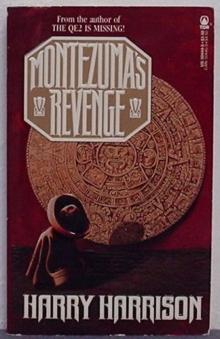 Montezuma's Revenge
Montezuma's Revenge The Ethical Engineer
The Ethical Engineer The Stainless Steel Rat Returns
The Stainless Steel Rat Returns The Misplaced Battleship
The Misplaced Battleship The Stainless Steel Rat is Born
The Stainless Steel Rat is Born Planet of the Damned bb-1
Planet of the Damned bb-1 The Stainless Steel Rat Goes to Hell ssr-10
The Stainless Steel Rat Goes to Hell ssr-10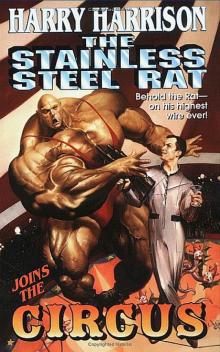 The Stainless Steel Rat Joins the Circus ssr-11
The Stainless Steel Rat Joins the Circus ssr-11 Galactic Dreams
Galactic Dreams The Harry Harrison Megapack
The Harry Harrison Megapack In Our Hands the Stars
In Our Hands the Stars On the Planet of Robot Slaves
On the Planet of Robot Slaves The Military Megapack
The Military Megapack Make Room! Make Room!
Make Room! Make Room! Wheelworld
Wheelworld Winter in Eden e-2
Winter in Eden e-2 The Stainless Steel Rat
The Stainless Steel Rat The Stainless Steel Rat Goes to Hell
The Stainless Steel Rat Goes to Hell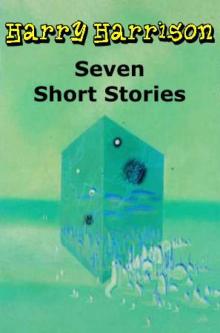 Harry Harrison Short Stoies
Harry Harrison Short Stoies Stainless Steel Rat 11: The Stainless Steel Rat Returns
Stainless Steel Rat 11: The Stainless Steel Rat Returns Stars and Stripes Triumphant sas-3
Stars and Stripes Triumphant sas-3 West of Eden
West of Eden The Stainless Steel Rat Go's To Hell
The Stainless Steel Rat Go's To Hell The Stainless Steel Rat eBook Collection
The Stainless Steel Rat eBook Collection Lifeboat
Lifeboat The Stainless Steel Rat Sings the Blues
The Stainless Steel Rat Sings the Blues Deathworld tds-1
Deathworld tds-1 On the Planet of Zombie Vampires
On the Planet of Zombie Vampires The Daleth Effect
The Daleth Effect On The Planet Of The Hippies From Hell
On The Planet Of The Hippies From Hell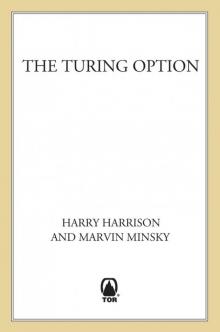 The Turing Option
The Turing Option The Stainless Steel Rat Gets Drafted
The Stainless Steel Rat Gets Drafted Bill, the Galactic Hero btgh-1
Bill, the Galactic Hero btgh-1 The Stainless Steel Rat in The Missing Battleship
The Stainless Steel Rat in The Missing Battleship The Stainless Steel Rat ssr-1
The Stainless Steel Rat ssr-1 The Ethical Engineer (the deathworld series)
The Ethical Engineer (the deathworld series) The Stainless Steel Rat Saves the World ssr-3
The Stainless Steel Rat Saves the World ssr-3 The Stainless Steel Rat Wants You
The Stainless Steel Rat Wants You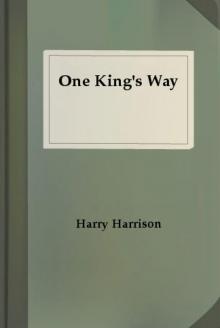 One King's Way thatc-2
One King's Way thatc-2 The Stainless Steel Rat Saves The World
The Stainless Steel Rat Saves The World Bill, the Galactic Hero
Bill, the Galactic Hero Stars & Stripes Forever
Stars & Stripes Forever Stars and Stripes In Peril sas-2
Stars and Stripes In Peril sas-2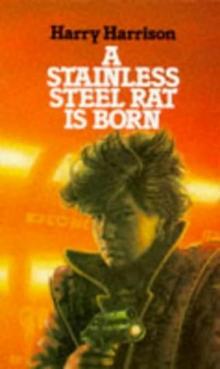 A Stainless Steel Rat Is Born ssr-6
A Stainless Steel Rat Is Born ssr-6 Star Smashers of the Galaxy Rangers
Star Smashers of the Galaxy Rangers Stars & Stripes Triumphant
Stars & Stripes Triumphant The Stainless Steel Rat Gets Drafted ssr-7
The Stainless Steel Rat Gets Drafted ssr-7 The Stainless Steel Rat for President ssr-5
The Stainless Steel Rat for President ssr-5 The Hammer & the Cross
The Hammer & the Cross The Technicolor Time Machine
The Technicolor Time Machine The Hammer and The Cross thatc-1
The Hammer and The Cross thatc-1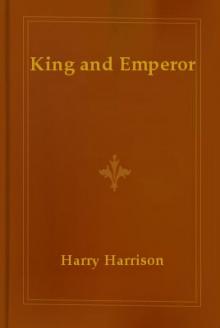 King and Emperor thatc-3
King and Emperor thatc-3 Return to Eden
Return to Eden The Stainless Steel Rat’s Revenge ssr-2
The Stainless Steel Rat’s Revenge ssr-2 West of Eden e-1
West of Eden e-1 Return to Eden e-3
Return to Eden e-3 A Transatlantic Tunnel, Hurrah!
A Transatlantic Tunnel, Hurrah! Stars and Stripes Forever sas-1
Stars and Stripes Forever sas-1 The Stainless Steel Rat Wants You ssr-4
The Stainless Steel Rat Wants You ssr-4 The Horse Barbarians tds-3
The Horse Barbarians tds-3 Planet of the Damned and Other Stories: A Science Fiction Anthology (Five Books in One Volume!)
Planet of the Damned and Other Stories: A Science Fiction Anthology (Five Books in One Volume!) On the Planet of Bottled Brains
On the Planet of Bottled Brains Stars And Stripes In Peril
Stars And Stripes In Peril The Stainless Steel Rat's Revenge
The Stainless Steel Rat's Revenge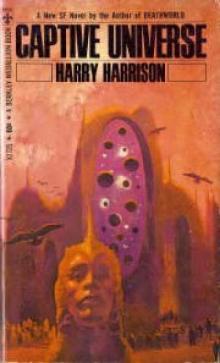 Captive Universe
Captive Universe The Stainless Steell Rat Sings the Blues ssr-8
The Stainless Steell Rat Sings the Blues ssr-8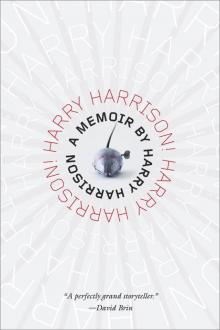 Harry Harrison! Harry Harrison!
Harry Harrison! Harry Harrison! Winter in Eden
Winter in Eden On the Planet of Tasteless Pleasures
On the Planet of Tasteless Pleasures